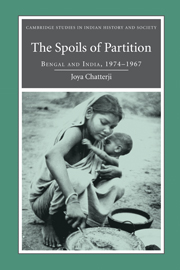Conclusion
Published online by Cambridge University Press: 25 June 2009
Summary
On 10 March 1966, thousands of people from all over West Bengal descended on Calcutta and marched to the government headquarters at Writers' Building. They formed a procession more than two miles long, paralysing the city. They came in response to a call from the parties of the left for a bundh, or complete shutdown, of life in the city. This spectacular show of strength followed three months of incessant campaigning by the parties of the left against food shortages, spiralling prices and government repression. Since January 1966, people all over the state had been looting markets for food and kerosene, students had been raiding their colleges, industrial workers had been holding their bosses hostage and daring party cadres had been attacking police stations and government offices. West Bengal's long winter of discontent had begun.
These troubles in Bengal took place against a backdrop of severe economic depression and widespread privation throughout India. For two years in succession, the monsoon had failed, making India's food supplies even more insecure than they were in normal times. In 1966, a sharp downturn in the economy forced the central government to devalue the rupee, forcing up prices all over India. In West Bengal, devaluation tipped the state's precarious economy into a deep and lasting crisis. Many of its ailing industries now collapsed irretrievably, and others went into serious recession.
- Type
- Chapter
- Information
- The Spoils of PartitionBengal and India, 1947–1967, pp. 310 - 317Publisher: Cambridge University PressPrint publication year: 2007



